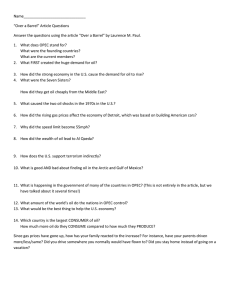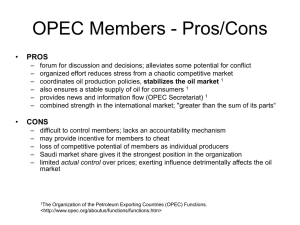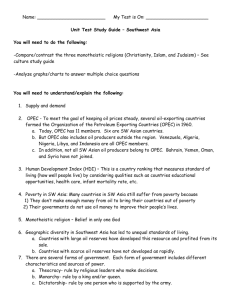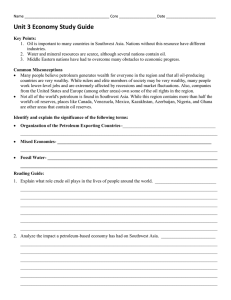Economy
advertisement
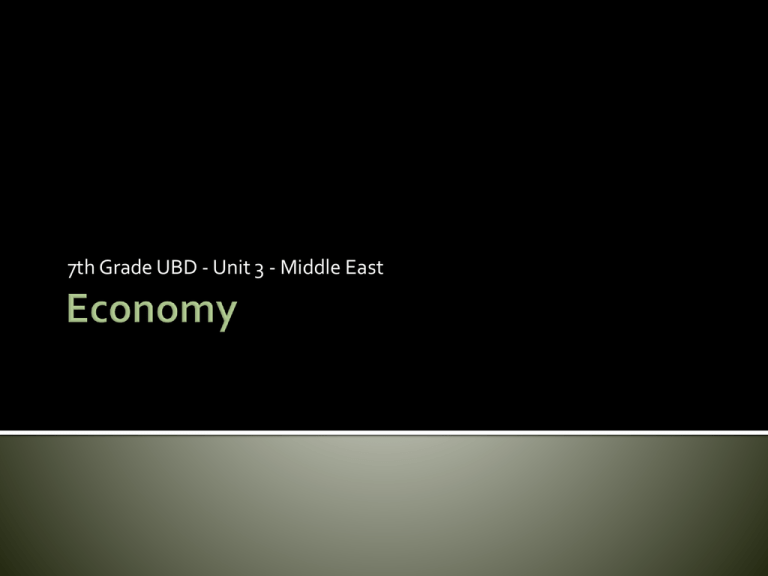
7th Grade UBD - Unit 3 - Middle East Work alone to complete a list of facts you know about Southwest Asia. You should come up with a list of at least five things. (4 minutes) Work with a neighbor and compare your answer with theirs. What things are the same and what things are different? (3 minutes) An economy is not just money, it's about businesses and how they work. It’s lemonade stands and how many dollars they take in. It’s taxes and salaries. Oil is important to many countries in Southwest Asia. Nations without this resource have different industries. Water and mineral resources are scarce, although several nations contain oil. Middle Eastern nations have had to overcome many obstacles to economic progress. Parts of the Fertile Crescent have rich soil. Syria has rich soil thanks to the Euphrates River and can produce large amounts of crops such as grains, fruits, and vegetables. Syria and Israel have increased food production by irrigating desert areas. Israel exports goods such as fruit and vegetables. Many crops, such as grapes, olives and figs thrive along the Black Sea. However, much of the land in Southwest Asia is not suitable for farming due to the harsh dry conditions. Irrigation allows a little more land to be used. Most herders and farmers struggle to earn a living in a harsh and dry climate. Irrigation makes farming expensive. Still, the government wants to increase food output. Water wells have also been drilled. Video- Differences Between Water & Oil Supply The Fertile Crescent lacks many useful mineral resources, but has great land for agriculture. Syria and Iraq are fortunate to have oil reserves. Iran's landscape is dotted with oil fields and pipelines. Key Terms Organization of the Petroleum Exporting Countries– Also known as OPEC, is an intergovernmental organization dedicated to stability and the shared control of petroleum. OPEC consists of twelve countries who sell oil on the world market. Because the members of OPEC control most of the world's oil supply, they are also able to set oil prices. For the developing nations of OPEC, controlling the price of oil is important. These countries are primarily exporters and do not consume much oil. Industrialized countries like the United States depend on foreign oil to fuel cars and run their economies. Member countries of OPEC are in Africa, Southeast Asia, and South America; however, the Middle Eastern countries have the largest oil reserves. An embargo is an agreement among suppliers to cut off access to particular buyers. OPEC refused to sell oil to countries that supported Israel. OPEC raised the price of oil, which had been extremely low, and refused to bargain. OPEC doubled the price of oil and caused massive energy shortages and economic distress, the embargo became a turning point for many countries. OPEC proved that it could control the world oil market. Western countries realized that they could no longer rely on cheap, readily accessible energy. As a result, countries began devising plans to drive more fuelefficient cars and to avoid the economic dangers of foreign oil dependency. Today, oil is more expensive than during the oil crisis of the 1970s. Instability in Southwest Asia has increased demand worldwide, and shrinking world resources are some reasons for record level prices. Middle Eastern countries are building modern economies. They have worked to improve agriculture, increase food production, set up industries, and end foreign influences. Economic progress is slow. Many countries lack good farmland, water, and technical know-how. Diseases and drought constantly threaten crops. War has also slowed down development. Despite such problems, Middle Eastern countries have made gains. Key Terms Mixed Economies- An economy in which some industries are privately owned and others are publicly owned or nationalized. Israel has developed both agriculture and industry. Israel benefits from an educated workforce. It has a strong electronics industry and diamondcutting industry. They want to develop the economy but preserve their traditional culture. They are using oil money to diversify. The Saudi government has supported the development of natural gas and small private factories that produce steel, cement, and chemicals. Key Terms Fossil Water- Water collected millions of years ago in underground pools. Modern technology has enabled this water to be tapped and distributed to remote areas. Video- 300 Years of Fossil Fuels in 300 Seconds Create a timeline of gasoline prices from 1973 till today. What has been the “muddiest” point so far in this lesson? That is, what topic remains the least clear to you? (4 minutes) Work with a neighbor and compare your muddiest point with theirs. Compare what things are the same and what things are different? (3 minutes)
